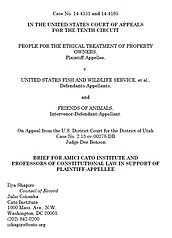People for the Ethical Treatment of Property Owners v. U.S. Fish and Wildlife Service
Learn more about Cato’s Amicus Briefs Program.
The U.S. Fish and Wildlife Service, exercising power purportedly delegated to it pursuant to Congress’s power to regulate interstate commerce, has classified the ubiquitous Utah prairie dog, which has no commercial value and has never dug holes in any lands beyond southwestern Utah, as “threatened” under the Endangered Species Act (ESA), thereby prohibiting the “take” of said prairie dogs—which essentially means doing anything that disturbs the little rodents’ habitat. If the varmints invade their property, human residents cannot build homes, start or operate certain businesses, or, in the case of Cedar City, protect playgrounds, an airport, and a local cemetery from their burrowing and barking. Joining as People for the Ethical Treatment of Property Owners (PETPO), and represented by the Pacific Legal Foundation, residents filed suit, claiming that the “take” rule for the noncommercial, intrastate Utah prairie dog exceeds Congress’s power to regulate interstate commerce. Congress has the power to regulate “commerce among the states,” not species. PETPO’s suit argues that the ESA cannot reach activities that are intrastate and noncommercial—activities, for example, like filling holes in your lawn or otherwise developing land where prairie dogs might live. The federal district court agreed and therefore struck down the “take” regulation. The case is now before the Tenth Circuit Court of Appeals. Joined by constitutional law professors Jonathan H. Adler, James L. Huffman, and Josh Blackman, Cato has filed a brief supporting the landowners. We argue, consistent with prior Supreme Court precedent, that the Constitution’s Commerce Clause affords Congress the power to regulate only items, channels, or instrumentalities of interstate commerce. If Congress wants to regulate activities that “substantially affect” interstate commerce, that power rests in the Necessary and Proper Clause, which gives Congress the means to regulate interstate commerce—provided those means are both necessary and proper. But the prohibited activities do not substantially affect interstate commerce. Moreover, the “take” rule is not necessary for regulating interstate commerce; Congress can regulate that commerce without prohibiting these residents from using their property. Nor is the rule proper since the power to regulate uses of property that do not affect interstate commerce belongs to the states. For those several reasons the “take” rule as applied to the Utah prairie dog exceeds the powers the Founders and the Founding generation delegated to Congress.

This work is licensed under a Creative Commons Attribution-NonCommercial-ShareAlike 4.0 International License.
